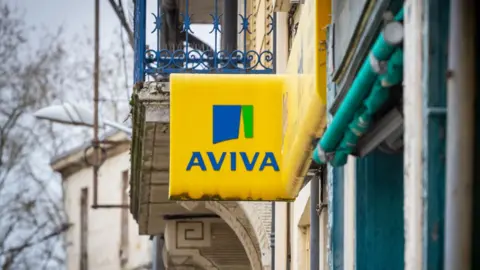**Overview of Aviva’s Proposed Acquisition of Direct Line**
The substantial £3.7 billion proposed takeover of Direct Line by Aviva is currently under scrutiny by the UK’s Competition and Markets Authority (CMA). This investigation could significantly slow down the deal that was initially agreed upon by both insurance companies in December of the previous year. The primary concern driving this scrutiny is whether the merger will lead to a “substantial lessening” of competition within the insurance market, particularly in relation to car insurance.
The proposed merger would create a formidable presence in the insurance sector, generating a combined entity that could serve as a major player in the car insurance market. This aspect has caught the attention of the CMA, which has the authority to assess and regulate competition across various industries in the UK. The CMA is set to release its findings from this review in July, marking a crucial moment for both companies as they await the determination of this regulatory body.
**Potential Market Impact and Company Shares**
Should the merger receive the green light from regulatory authorities, it would result in a combined company that could rival other prominent insurers, such as Legal & General and Prudential, in terms of market capitalization. Shareholders from Aviva would command approximately 87.5% of the new organization, while those from Direct Line would take home about 12.5%. The resultant firm would control over 20% of the home and motor insurance market in the UK, raising alarms regarding competition and market share domination.
Direct Line is not merely a standalone entity; it encompasses well-known brands such as Churchill and Green Flag, thus expanding its offerings to include car, pet, home, and various other insurance policies. This diverse portfolio further enhances concerns that the merger might stifle competition across multiple insurance domains, not just in vehicle insurance.
**Different Perspectives on Regulatory Concerns**
Interestingly, when this takeover was initially considered, expert analysts, including those from JP Morgan, expressed that they did not foresee any significant competition issues arising from the deal. Nonetheless, the CMA’s current stance reflects a cautious approach, cautioning that the creation of a single entity out of Aviva and Direct Line “may be expected to result in a substantial lessening of competition within any market or markets in the United Kingdom for goods or services.” This illustrates a potential divergence between market expectations and regulatory assessments, underscoring the complex dynamics involved in corporate mergers.
**Engagement with Stakeholders and Future Steps**
The CMA has taken proactive measures to involve public opinion and seek feedback from interested parties regarding the prospective merger. Stakeholders and any entities that could be affected by the deal are being encouraged to submit their input by May 29. This inclusive approach allows individuals and companies to voice their concerns or support for the merger, potentially influencing the CMA’s final decision.
Furthermore, Aviva has been approached for comments on the regulatory investigation, indicating that they too are preparing for the scrutiny that accompanies such a high-profile acquisition. As the merger unfolds, how both companies communicate and respond to these challenges, as well as the CMA’s findings, will be crucial in determining the trajectory of this significant deal.
Overall, Aviva’s attempt to acquire Direct Line represents a pivotal moment in the UK insurance market, one that is being closely monitored by regulators, competitors, and consumers alike. The implications of this proposed merger stretch far beyond the balance sheets, impacting the competitive landscape and ultimately influencing consumers’ insurance choices across the United Kingdom. The forthcoming reports from the CMA could significantly shape the future of not just these two firms but also the wider insurance industry amid increasing consolidation efforts.



